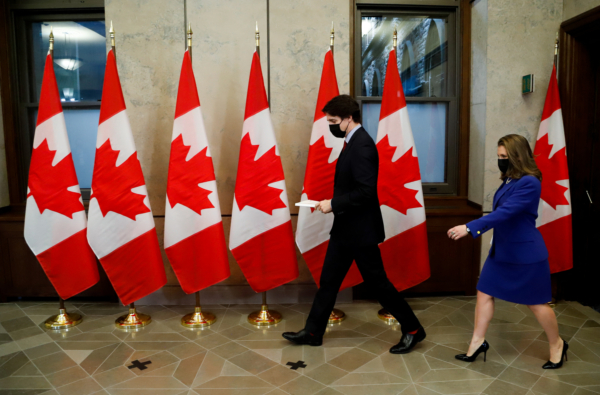 Canada's Prime Minister Justin Trudeau and Finance Minister Chrystia Freeland arrive before posing for a picture holding the 2022-23 budget, on Parliament Hill in Ottawa, Ontario, Canada 7 April 2022;
Credit: Patrick Doyle / Reuters
Canada's Prime Minister Justin Trudeau and Finance Minister Chrystia Freeland arrive before posing for a picture holding the 2022-23 budget, on Parliament Hill in Ottawa, Ontario, Canada 7 April 2022;
Credit: Patrick Doyle / Reuters
TORONTO (Reuters) - Canada's Prime Minister and Deputy Prime Minister affirmed on Tuesday 3 May 2022 their support of women's right to choose after a leaked draft ruling suggests the United States (US) Supreme Court is prepared to strike down a landmark decision legalising abortion.
The Bloc Quebecois, a federal political party, also moved a motion in Canada's Parliament Tuesday to recognise a woman's "free choice in the matter of abortion."
Deputy Prime Minister Chrystia Freeland said she was "both shocked and deeply troubled" by the leaked ruling and said her government has a "clear and determined commitment" to protect a woman's right to choose.
"We'll never back down from protecting and promoting women's rights in Canada and around the world," Prime Minister Justin Trudeau said in a tweet.
Candice Bergen, interim leader of the opposition Conservatives, who are in the process of choosing a new leader, said none of the party's members would comment on the leaked draft. But Bergen did say the Conservatives "will not introduce legislation or reopen the abortion debate."
She accused PM Trudeau of using abortion as a wedge and said if there were a vote, Conservatives could vote freely.
Canada's Supreme Court decriminalised abortion in a historic 1988 ruling. Ostensibly, since then, abortion has been a medical procedure like any other. But barriers to access persist, especially for people living outside urban areas.
Canada's top court is unlikely to re-criminalise abortion any time soon but if the US Supreme Court overturns Roe v. Wade that could embolden anti-abortion movements and galvanise abortion activists, Canadian observers and advocates both for and against abortion told Reuters.
The US ruling, which is not due until June, will "definitely give juice to the anti-abortion forces," said Judy Rebick, who has been fighting for abortion access in Canada since doctor Henry Morgentaler defied the ban in the 1980s.
But abortion opponents face more of an uphill battle in Canada, where activists built community support decades ago, Ms Rebick said. "You have a huge pro-choice majority which has mobilised time and time again."
Jack Fonseca, director of political operations for the anti-abortion Campaign Life Coalition, predicted a "pro-life blossoming" if the US Supreme Court overturns Roe v. Wade, with people looking to make changes south of the border a reality in Canada.
While Canadian abortion opponents wait for an anti-abortion political sea change, Mr Fonseca said, his group may push for interim measures such as a de-listing of abortion from health services provinces cover.
Canada is unlikely to see a similar rollback of abortion access on a national level, said political scientist Emmett Macfarlane, as the top court is less polarised and partisan than the US Supreme Court.
"What I'll be watching for is, who does this mobilise? Does this mobilise the anti-choice movement in Canada, and are the pro-choice majority complacent? Or does it raise the hackles of the pro-choice majority?"
Carolyn Egan's phone was ringing Tuesday morning with "outraged" people "wanting to do something," said the longtime abortion activist and organiser with Ontario Coalition for Abortion Clinics.
"It's really raising a clarion call here."








